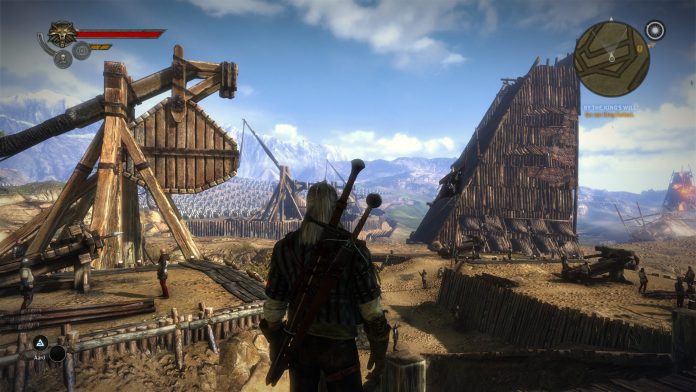Before viewers who raved about The Witcher Netflix series could be called posers by those who have played The Witcher 3: Wild Hunt, gamers who raved about The Witcher 3: Wild Hunt could be called posers by those who already played The Witcher 2: Assassins of Kings.
The second game in the series and the series’ first console outing (the first was released only on PC) is an exceptional achievement. It shows great ambition at a time when few games aimed so big: dense storytelling taking place in expansive, realistic locations filled with a larger and larger array of tasks. All of it was so well-realised it feels fresh ten years after it was first released, and it’s able to stand in comparison with its eighth-gen successor.

That said, with so much to take in and do, playing the game is such a huge undertaking and is relentlessly macho and unsavoury that it’s hard to really call it a fun experience. In order to admire The Witcher 2, players will need to invest a lot of time, dedication and mental energy to keep progressing and seeing all of the extraordinary sights CD Projekt Red have on offer. The end result is a worthy but complicated game with a niche window of appreciation.
Assassins of Kings is an RPG that follows the eponymous witcher, or magically-mutated monster slayer, Geralt of Rivia (one of the many great character names, with Stennis, Zoltan Chivay and Dethmold also being highlights), on a mission to prove his innocence after being framed for the murder of a king. There really is not enough room here to describe the plot in full detail.
Those who like their fantasy fiction to go in deep will be right at home here, though it is completely possible, if confusing, to play without having to understand everything that is going on. However, the actions the player takes in the game influences story developments and ultimately decides the game’s ultimate outcome. The changes are not drastic but it does mean a dip in focus on the narrative could see some narrative threads go unresolved.
To succeed on his quest Geralt can make use of his skills as a swordfighter and alchemist as well as his abilities to cast spells and craft new items; all can all be upgraded as the game goes along. His mission takes him to a number of original locations, wherein the plot deepens and more of this fantasy geography is revealed.

One thing that is undeniable about The Witcher 2 is its extraordinary graphics. CD Projekt Red have done a great job realising this expanse with no visual reference, as the fantasy world of author Andrzej Sapkowski had previously almost entirely appeared on the page (it had previously been adapted into a film and TV series in Poland).
It’s not unlike other fantasy worlds seen before: a dirty and squalid middle-age type setting, but it all looks so impressively real. Geralt and company will come up against a number of creatures unique to the series, with all the other usual fantasy identities and races also present; ghouls, elves, dwarves, trolls, dragons and all manner of humans practising magic.
That said, travelling across the game’s impressively large landscapes on the one hand gives plenty of opportunity for exploration, but does get tiresome the longer the game goes on. The sheer amount of distance to cover in Assassins of Kings can be actually exhausting and the need for a Fast Travel option becomes greater and greater around the second act.
Despite the impressive realism on display, the world of The Witcher makes those seen in Game of Thrones look positively virtuous. Each of the three main locations here, Flotsam, Aedirn and Loc Muinne, are consistently seedy and unsavoury, full of combative ruffians who have nothing nice to say. They aren’t the nicest places to inhabit, in short.

It is also worth noting that it is guilty of an increasingly suspect trope of modern-day fantasy: there is a lot of nudity; all of it women. Men are allowed decency whereas the female cast regularly bare all. This, along with the many women who are objectified, raped and frivolously killed doesn’t help alleviate any air of machismo and misogyny in the game.
When the quests are underway, though, the game is at its strongest. Much of them will feature either exploration or swordfighting (of which the game’s fighting mechanics will feel familiar: a light attack, a heavy attack and defensive stance) but Assassins of Kings is nicely varied.
As well as battles there are stealth sections, a fair bit of detective work, fetching quest items, exploring lost ruins and even a few romantic diversions (or as close as this licentious world gets to romance). There’s everything from fighting a battle in the memories of a recently deceased soldier to reuniting a lost troll couple. Some missions, wow do they go on, but it is worth persevering with The Witcher 2 to experience the wide variety of gameplay it has to offer.

When it was released in May 2011, Assassins of Kings was well-received by both critics and fans, going on to sell over a million copies. Though the game performed well, it didn’t make much the same impression its successor did four years later.
Today, The Witcher 2 is still an extremely impressive and admirable game, but it will take the right person to love it – players who like long, immersive games with plenty of options and are fans of the fantasy genre. They can still easily find copies of this game online and through the Xbox Store and Steam. Even if you don’t necessarily fall into any of those categories, Assassins of Kings is still a very worthwhile experience, but those players will feel more a sense of relief than satisfaction when they can finally put it down.
